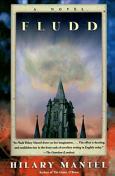BKMT READING GUIDES
Fludd: A Novel
by Hilary Mantel
Paperback : 181 pages
1 club reading this now
0 members have read this book
One dark and stormy night in 1956, a stranger named Fludd mysteriously turns up in the dismal village of Fetherhoughton. He is the curate sent by the bishop to assist Father Angwin-or is he? In the most unlikely of places, a superstitious town that understands little of romance or ...
Introduction
One dark and stormy night in 1956, a stranger named Fludd mysteriously turns up in the dismal village of Fetherhoughton. He is the curate sent by the bishop to assist Father Angwin-or is he? In the most unlikely of places, a superstitious town that understands little of romance or sentimentality, where bad blood between neighbors is ancient and impenetrable, miracles begin to bloom. No matter how copiously Father Angwin drinks while he confesses his broken faith, the level of the bottle does not drop. Although Fludd does not appear to be eating, the food on his plate disappears. Fludd becomes lover, gravedigger, and savior, transforming his dull office into a golden regency of decision, unashamed sensation, and unprecedented action. Knitting together the miraculous and the mundane, the dreadful and the ludicrous, Fludd is a tale of alchemy and transformation told with astonishing art, insight, humor, and wit.
Editorial Review
Fetherhoughton, the shabby and provincial village of Hilary Mantel's fifth novel, Fludd, possesses a charm that is, at best, latent. The surrounding moorland is foreboding, the populace is querulous and ill-educated, and the presiding priest is an atheist. It's 1956, and drabness is general to this English backwater. Until, that is, the appearance of a disarming young priest who, apparently, has been dispatched to wrest Fetherhoughton out of its superstitious stupor. One of the novel's several wonders is that Fludd surpasses all expectations.Father Angwin, Fetherhoughton's disbelieving priest, has--much to the displeasure of his superiors--grown comfortable with the entrenched, misapprehending devoutness of his flock. Fludd, who may or may not be the curate sent to deliver the wayward, exerts an immediate, if unexpected, influence. He intrigues the townspeople, flusters the church's gaggle of nuns, kindles a welcome self-examination in Father Angwin, and arouses the passion of the young and yearning Sister Philomena. A charge of possibility suddenly animates the village, accompanied by several incidents that seem midway between coincidence and miracle. Fludd, however, remains beset by an insistent disillusionment--his clarity, it seems, arcs outward only.
Mantel's cramped and pliant village is a marvel. Fetherhoughton "wrestles not against flesh and blood but against principalities, against powers, against the rulers of the darkness of this world," insists the dour headmistress, Mother Perpetua. A local tobacconist, not so trivially, just might be the devil in human garb. Fludd's gift lies in unearthing all the lovely and fearsome truths buried just beneath the surface. "The frightening thing is that life is fair," he observes, "but what we need... is not justice but mercy." The fruits of this conviction, in Fetherhoughton, are rebellion, self-assertion, and even scandal; but Mantel's lovely tale suggests that difficult possibility is fair compensation for a sloughed predictability. --Ben Guterson
Discussion Questions
No discussion questions at this time.Book Club Recommendations
Recommended to book clubs by 0 of 0 members.
Book Club HQ to over 90,000+ book clubs and ready to welcome yours.
Get free weekly updates on top club picks, book giveaways, author events and more








